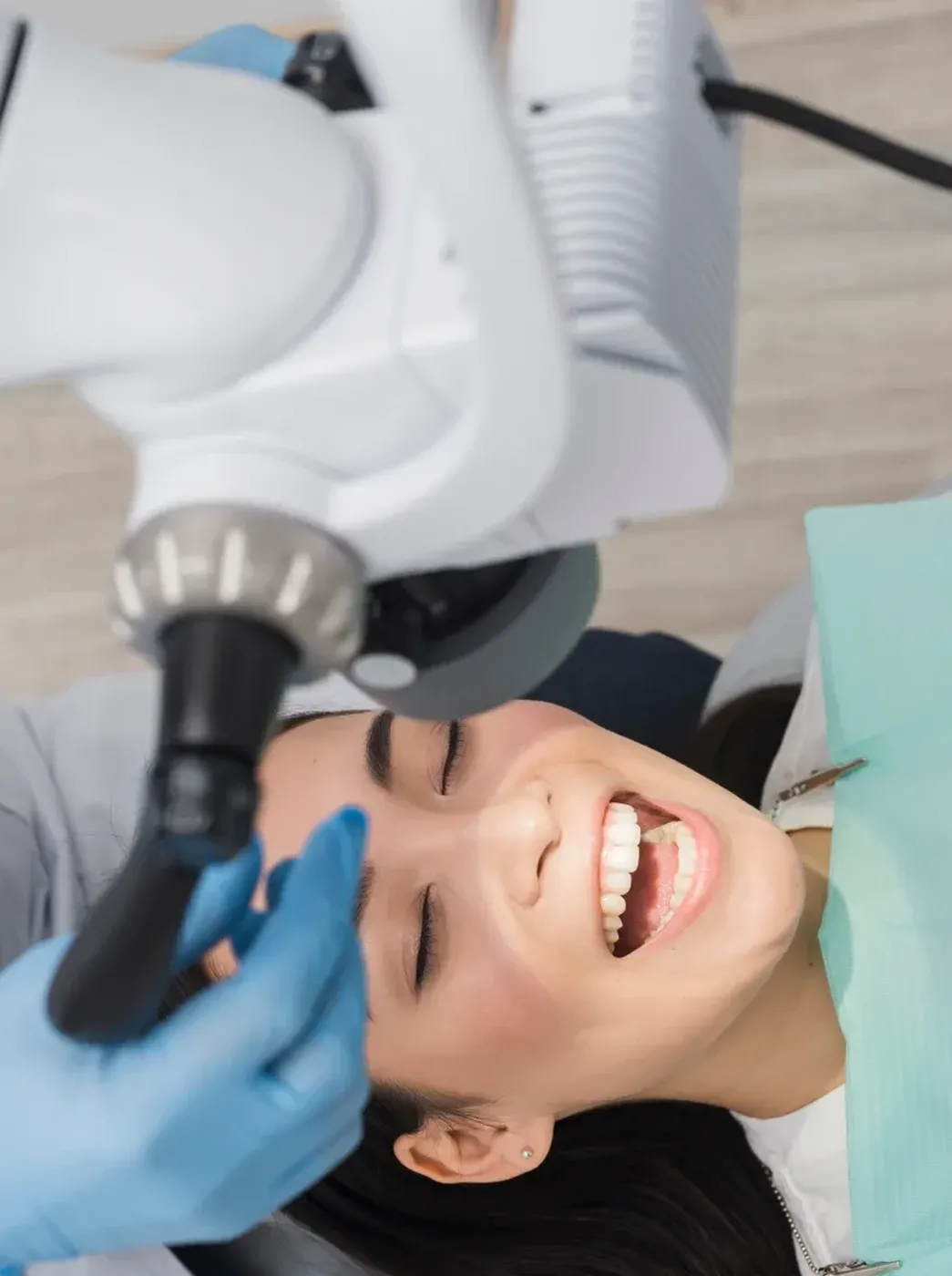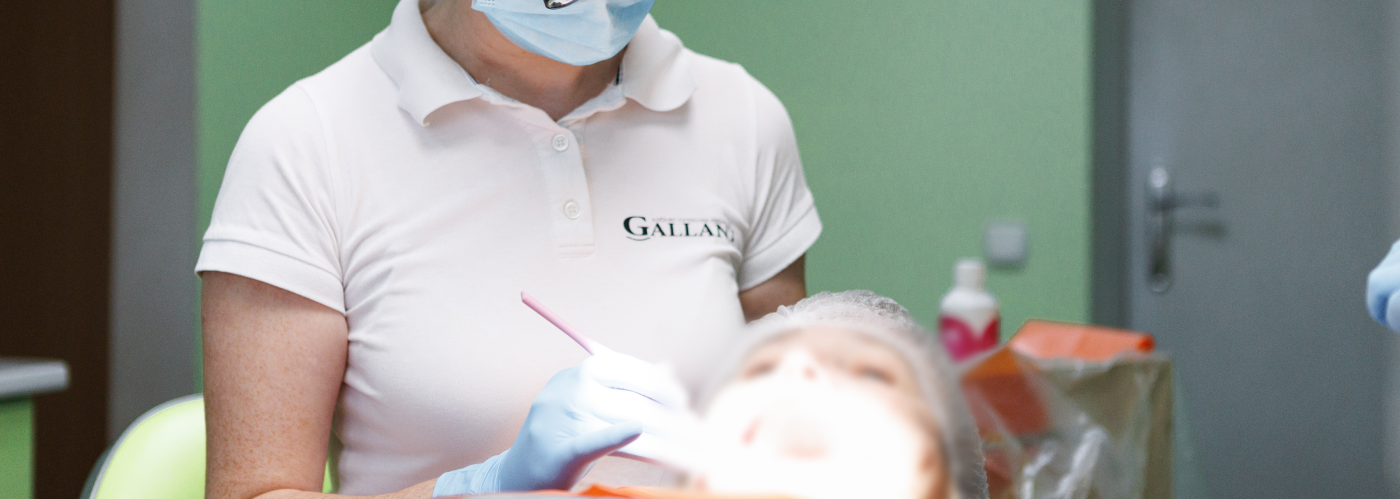
Dental treatment during pregnancy
Pregnancy is a special period when expectant mothers await their baby with joy and anticipation. Although this time is often filled with pleasant moments, pregnant women occasionally encounter dental problems that can cause discomfort and even pose risks to a smooth pregnancy.
Dental treatment during pregnancy is a delicate process, but at our Gallant Clinic, it can be carried out perfectly. We use the latest safe diagnostic and treatment methods to protect the fetus and improve your dental health.
Diagnostic features for expecting mothers
To accurately diagnose oral diseases and select optimal treatment, dentists recommend additional examinations after the initial examination. One key method is radiography, typically performed during the second trimester. In exceptional cases, it may be done during the first or third trimester. To minimise fetal radiation exposure, a lead apron is placed over the abdomen.
One of the safest diagnostic methods is radiovisiography—a small sensor is placed on the target area. This method is completely safe and provides sufficient information for accurate diagnosis. We also maintain a record of all diagnostic data during pregnancy.
Is it possible to treat teeth during pregnancy?
Many pregnant women are cautious about dental treatment because of fears for their health and the baby's. These concerns are partially justified, and dentists only proceed when the absence of treatment could cause significant harm. For non-critical situations, dental procedures are postponed to the second trimester or even after delivery.
The best time for dental care is pre-pregnancy planning, when the body isn't under strain and there's no risk for the fetus. Moreover, avoiding stress supports overall health.
Even if a cavity must be treated in the third trimester, modern safe medications and methods ensure minimal risk.
Common dental issues during pregnancy
Due to rapid calcium loss, hormonal changes, and immune suppression, pregnant women often experience:
- Gingivitis – gums become inflamed and bleed easily. Excellent oral hygiene and antiseptic mouthwash are essential.
- Tooth decay – calcium and fluoride loss, along with existing cavities, can accelerate decay, requiring treatment to prevent complications.
- Broken or lost fillings – bacteria can quickly infect exposed areas, making urgent treatment important.
- Periodontitis – untreated, this can loosen teeth and cause gum swelling, which can spread infection and pose risks to the fetus (including miscarriage).
- Periodontosis – receding gums and root exposure, increasing tooth mobility and risk of loss.
- Pulpitis – infected dental pulp can affect the placenta and fetal development.
- Stomatitis – frequent due to immune changes, and can become chronic.
- Periostitis (dental abscess) – a serious condition that can cause systemic infection. In such cases, extraction and antibiotics may be necessary to protect both mother and baby.
Key Aspects of Dental Treatment During Pregnancy
There are certain limitations regarding dental procedures during pregnancy. The following are generally not recommended:
- Orthodontic treatment (such as placing braces);
- Orthopedic procedures (such as permanent prosthetics and implants);
- Teeth whitening;
- Tooth extraction without urgent need, especially wisdom teeth.
As for conditions such as caries, pulpitis, gingivitis, periodontitis, filling placement, and other dental procedures, they are absolutely possible during pregnancy, provided a careful approach is taken.
Doctors advise addressing dental issues before childbirth, as any infection (even in the mother’s oral cavity) can pose a threat to the child’s health. It is also worth considering that dental treatment after childbirth may be more complicated, so it’s best to take care of these matters during pregnancy planning or at least before giving birth to avoid complications.
If you are experiencing tooth pain or notice enamel darkening, contact our dental clinic. We provide painless and effective dental treatment that does not harm your baby’s health and ensure the comfort of our pregnant patients.
Treatment During Different Trimesters
First Trimester (up to 12 weeks) - a critical period for fetal development, during which the major organs are forming. At this stage, women often suffer from nausea. Treatment requires great caution: the dentist may prescribe safe topical medications and remineralisation therapy. If necessary, the doctor will choose the least harmful methods for both mother and child.
Second Trimester (13–24 weeks) - a period when the placenta fully protects the fetus. Dental and gum treatment at this stage is considered safe. Women often experience no discomfort during dental procedures, and modern medications ensure effective and safe care.
Third Trimester (after 25 weeks) - the body becomes more sensitive, and visiting the dentist may cause stress. Dental treatment at this stage is recommended only for urgent indications, as medications can affect the condition of the uterus and the fetus.
Request a call
We will contact you to schedule a convenient time for your consultation and connect you with the right specialist
What type of diagnostic method is safe for pregnant women?
One of the safest diagnostic methods is radiovisiography. This technique involves using a small sensor placed on the required area of the jaw and teeth. Radiovisiography is completely safe while providing sufficient information for an accurate diagnosis.

What type of anesthetic can be used for dental treatment during pregnancy?
The anesthetic Ultracaine can be safely used for dental treatment during pregnancy.

Which dental procedures are not allowed during pregnancy?
- Orthodontic treatment (installation of braces)
- Orthopedic procedures (fixed prosthetics, implantation)
- Teeth whitening
- Tooth extraction without urgent necessity, especially wisdom teeth

In which trimester is it safe to undergo dental treatment?
Second trimester (13–24 weeks)

Testimonials
Amazing team. Thank you.


Request a call
We will contact you to schedule a convenient time for your consultation and connect you with the right specialist

Request a call
We’ll get back to you shortly!

Leave a Review
Your feedback means a lot to us!


